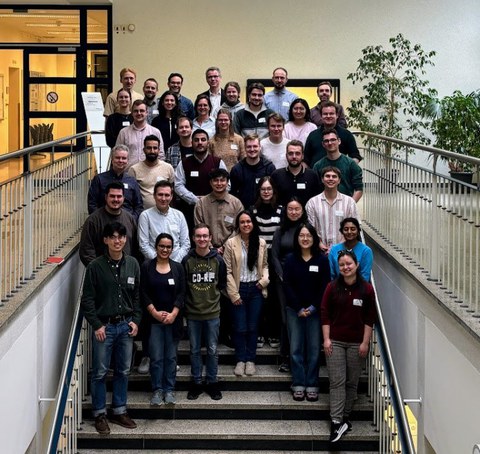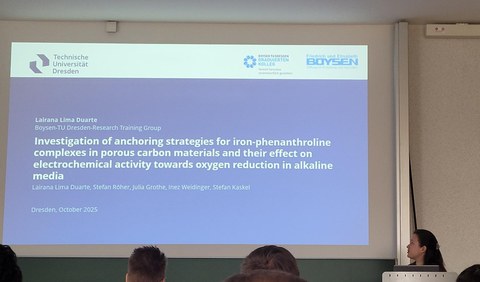Nov 21, 2025
Doctoral Student Lairana Lima Duarte at Stefan Kaskel's NanoDays
From October 8 to 10, 2025, doctoral students and postdocs from the Departments of Inorganic Chemistry at six German universities working on nanomaterials and nanotechnology met at RWTH Aachen University for this year's NanoDays.
The Boysen-TU Dresden Research Training Group and the Kaskel Group were represented by doctoral student Lairana Lima Duarte (subproject G1), who gave a presentation on her work on anchoring strategies for metal complexes in carbon materials.
The conference is celebrating its 20th anniversary, having been launched in 2005 by Prof. Stefan Kaskel (Chair of Inorganic Chemistry I at TU Dresden and scientific supervisor of RTG subproject G1). The NanoDays aim to bring together young researchers from the cooperating working groups to present and discuss their progress on joint research topics and thus strengthen German nanoscience research. In an informal atmosphere, participants will have the opportunity to engage in lively scientific exchanges and gain inspiring insights, including discussions on their presentations introducing new ideas on related topics, advice on experimental procedures, next steps and possible future collaborations.
Aleena Jose (PCL-TRG 2861) was another representative of the Kaskel group and presented her work on reactive precursors for the synthesis of planar carbon lattices. As a result of last year's meeting in Karlsruhe (the RTG reported), Ms. Lima Duarte modified her experimental procedure to improve the reproducibility of the measurements. This was done on the advice of Dr. Sabita Bhandari, a postdoctoral researcher at RWTH Aachen University, who had also worked on iron-nitrogen-carbon catalysts (FeNC) for the oxygen reduction reaction during her doctorate. New insights, advice and suggestions gained during this year's event will be explored in the next steps of Ms. Lairana Lima Duarte's research.

Participants at this year's NanoDays in Aachen.
The RTG doctoral student also chaired the final round of talks on October 10, 2025, where Advisors from Aachen and Koblenz presented their work on nanoparticle synthesis by exsolution and microwaves, catalyst doping and catalysis for the dry reforming of methane, N2O decomposition and CO2 conversion.
TU Dresden was further represented by Mohammad Mehmandoust from Prof. Ruck's group, who presented his research results on microfluidic exfoliated 2D quantum materials - the 2025 Nobel Prize in Physics was awarded in this field for the discovery of macroscopic quantum mechanical tunneling and energy quantization in an electric circuit. The announcement of the 2025 Nobel Prize in Chemistry in the same week of the conference generated excitement among participants as it was for research on nanomaterials and was awarded to Omar M. Yaghi, Susumu Kitagawa and Richard Robson for the development of metal-organic frameworks (MOFs), an area in which Boysen-TU Dresden PI Prof. Stefan Kaskel has been very active in research for 20 years.
This year's host Prof. Simon Ulrich (RWTH Aachen University) presented a current collaboration in which researchers from all over the world have compiled the "33 unsolved questions in nanoscience and nanotechnology" (https://pubs.acs.org/doi/full/10.1021/acsnano.5c12854). They shed light on the direction in which the field should develop in the coming years.

